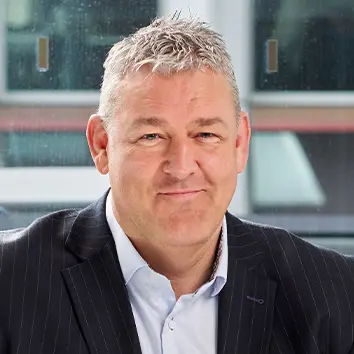This article was originally published in Insurance Post.
Lewis Cunningham, claims handler at RSA, was recently crowned the winner of the third series of Claims Apprentice. Post sat down with Lewis and sponsor Kennedys’ own ‘Lord Sugar’: partner and head of marine practice, Chris Dunn, to hear their thoughts on the experiences and challenges they faced throughout the apprentice selection process.

Do your homework. Do your research on the tasks. Watch previous episodes. Then just apply and put your all into it. Working hard beats knowledge every day of the week, so just go for it.
First of all, Lewis, congratulations on being named Claims Apprentice 2022. How did you find the filming process, and what were your thoughts when you watched the episodes back?
At first it was difficult having the cameras around when meeting new people, but after a while you forget they are there, and you just start cracking on with the tasks. Also, it was good working with (fellow Team Build members) Jo (Barker) and Martin (Fleet), as they had a couple more years’ experience of working in the insurance market and of working in London.
However, when I came back down to London again for the interviews, that’s when the nerves started again. I cringed a bit when I was watching the presenting task. At the time, I thought I’d done quite well, but you can hear I’m nervous. It was my first time presenting anything to a group of people since – probably, school – so I was using a different skill, but I feel like I’ve grown in confidence since.
Which was your favourite task? And which did you find the most challenging?
My favourite was the environmental, social and governance task. Beforehand, I’d barely heard of ESG, but the candidates and mentors helped me understand what it means to businesses. From there I felt we had a really good idea and I was confident that we’d do well, but then Team Unite did too. I was proud of our video – what we produced.
The ESG task saw you take a leading role in the video. Who is your acting role model, and does a career on screen beckon if claims management doesn’t work out?
Acting definitely isn’t on the cards, and I’m not that into films, but I’d probably say Stephen Graham or Liam Neeson.
Since you were crowned Claims Apprentice 2022, what has been the reaction from friends and colleagues?
The reaction’s been really good. Everyone was as stunned as I was. You could tell on the video that I wasn’t really expecting it.
And it’s taken me to another level in my work. I’m taking real pride in what I do every day and everyone’s very proud of me. The news spread like wildfire around the office, and my friends were really excited to watch the videos. I have to thank my manager and friends because they’re the ones who encouraged me to go for it.
What skills do you think you brought to the tasks? As the youngest candidate, were there any areas where you felt less confident?
I wasn’t that confident at presenting, but the key skill was being able to work with the team. I enjoyed working with Jo and Martin, as we had lots of ideas, and we’re all very inquisitive people. But to win the tasks, we had to settle on one quickly because we didn’t have much time to carry it out.
I’ve always known that I’m a good people person, but I hadn’t realised I could lead or influence people in that way. Now, after Claims Apprentice, I could lead a team if I wanted to.
What did you learn from the process? Did anything surprise you?
I learned how to cooperate with different people. There are often fewer differences between you and others than you imagine. It’s about how you interact with others to get the best out of them.
Teamwork is one of the most essential skills you can have in business. Sometimes it’s easy to think you should just get your head down and crack on with a particular task, but you can often find the answers to questions you have more quickly by speaking to others.
Don’t be afraid to approach senior colleagues and learn from their experience and mistakes!
What is next for you in your career?
I’m working towards qualifying as a loss adjuster. I’ve got a great mentor at RSA, who has taken me out on site visits to see how businesses get back on the road after a loss.
My mum and dad were self-employed for about 30 years, so it’s something I’m really passionate about – helping businesses through challenging times. It’s what insurance is all about at the end of the day.
Would you do the Claims Apprentice experience all over again?
I definitely would do something like this again because it’s a little taste of what’s out there. The more you do things, the better you get. Even if you fail a hundred times, you’re going to get good experience. I’d recommend it to anyone.
What advice would you give to someone thinking of applying for next year’s Claims Apprentice?
Do your homework. Do your research on the tasks. Watch previous episodes, see what tasks have come up and who performed better than others. Then I’d say just apply and put your all into it. Working hard beats knowledge every day of the week, so just go for it!
Q&A Christopher Dunn, Kennedys
How were the ideas for the tasks put together?
It was a collaborative effort including the mentors in charge of each task, with help from our marketing team and Post. The teams had subject specialists with them from Kennedys. As head of marine, I was very keen to get a maritime aspect in there, so one of my colleagues, Chris Chatfield, set what I thought was the very interesting treasure hunt task.
What were your expectations at the outset? Was there anything that surprised you along the way?
The biggest surprise was the immediacy of the tasks. The candidates didn’t get a lot of time to muster themselves, form a team, come up with a solution and deliver it. It was highly time-pressured. For the ESG task in particular there was only a short time for the teams to develop their proposition and present it to industry leaders. But you’ve got to think on your feet in any line of business. You’ve got to adapt. The candidates showed real maturity in that regard.
How do you think the process went? Is there anything you’d like to have done differently?
Playing the Lord Sugar role meant I saw a little less of the detail. It was a bit more remote for me. But I learned a lot on the mentors and others. It’s a collaborative approach and I was very happy with the feedback I received.
Success in the tasks relies on teams coming up with innovative solutions under pressure. What’s the key to unlocking that innovation when working with a team?
Communication. Within the teams there was a lot of debate about who was going to communicate the ideas, who was going to carry them out and what the aims and objectives were. The leaders emerged as the ones who could get their ideas across and bring others into their thought process.
What skills were you hoping to see from the candidates?
I wanted to see a future market leader. Somebody who had some innovative ideas, who wasn’t afraid to make mistakes, who was able to push the candidates in a particular direction without fear of failure. If you believe in yourself and gain the enthusiasm and support your colleagues, that’s somebody who is going to be a good leader in the market.
But in fact all the ideas were first-rate – what the teams managed to do in a very short period of time was really impressive.
What was it that swung the decision in Lewis’ favour?
In all the situations where it could have gone one way or the other, Lewis was always the pivot saying ‘Let’s do this…’ or ‘Let’s do that…’. He had very specific ideas for the tasks and he put them across in a very reasoned way. That’s why he was the outstanding candidate for me.
All six candidates were really credible individuals. I hope they all got something out of the process and will put that experience to good use in insurance as an innovative solution-led market.
How do you expect the claims management landscape to change in the next five to 10 years? What innovations are we likely to see there?
I read somewhere that the majority of jobs that will exist in five years’ time haven’t even been created yet. That could be the case for insurance as an innovative tech-driven market, for example in how Lloyd’s is looking at tech solutions to respond to market pressures. In Claims Apprentice we were looking for a tech solution to the ESG task – it’s a microcosm of the market’s challenges.
Everyone’s also facing the conundrum of how to encourage office attendance versus remote working, and how to bring more flexibility to their product and service offering. The landscape will change considerably and I hope London stays at the epicentre. To do that we need two things. First, market cohesion – for people to get together and drive London’s reputation for innovation and ideas as the insurance market. Second, for each individual to come up with solutions to aid the process.
The skill sets are changing too. As a law firm in the insurance world, we’re seeing people coming from more diverse backgrounds with all sorts of knowledge across arts and sciences, which helps to promote a richer culture for innovation and ideas that will drive the industry forward.

Lewis had very specific ideas for the tasks and he put them across in a very reasoned way. That’s why he was the outstanding candidate for me.
 United Kingdom
United Kingdom